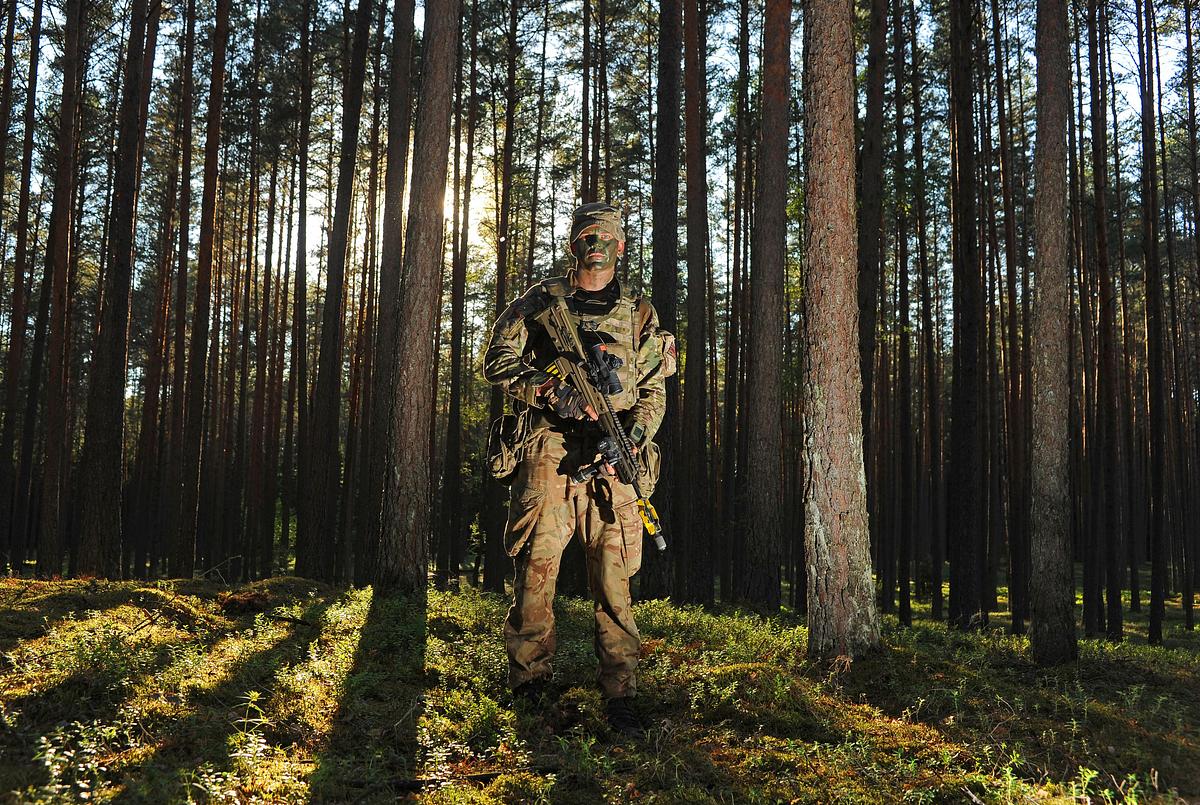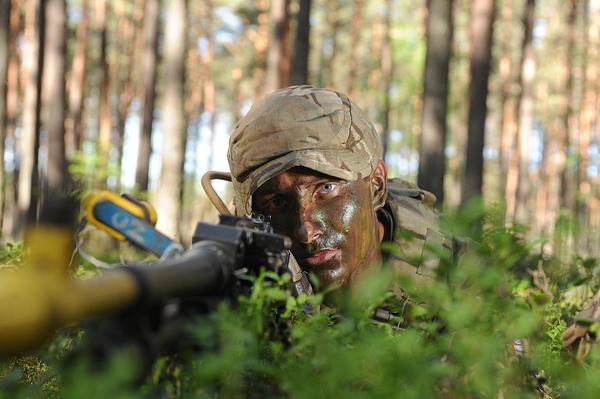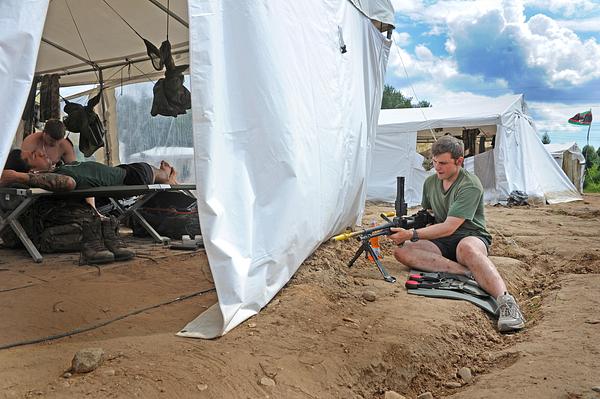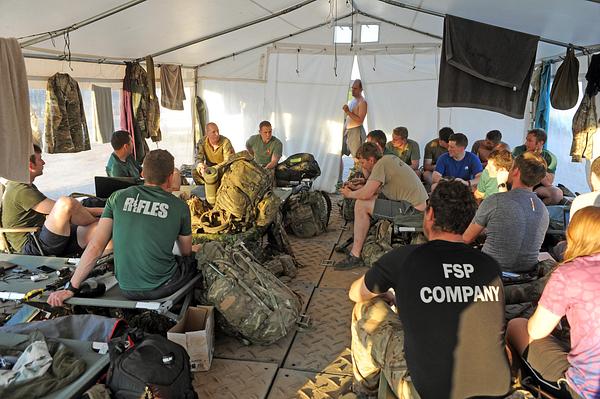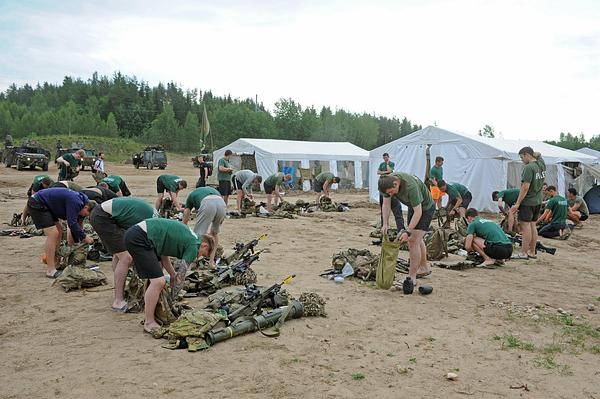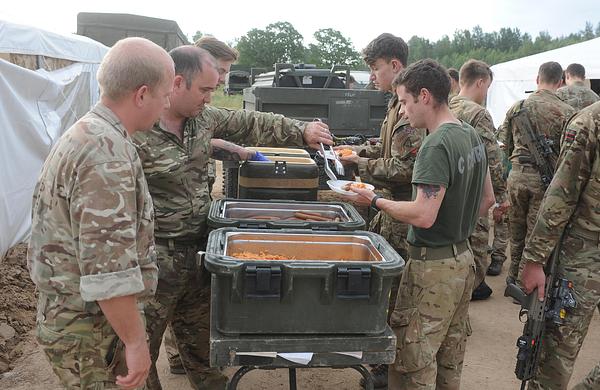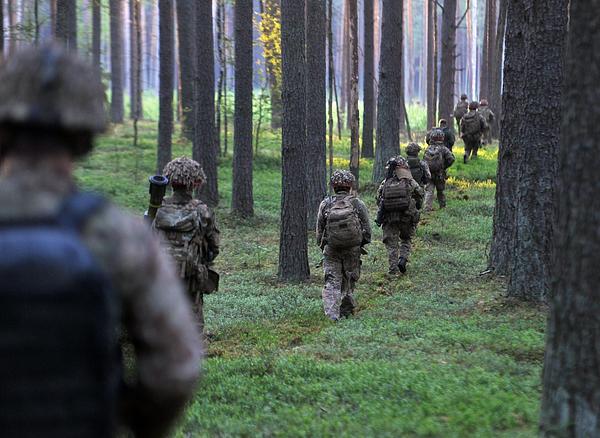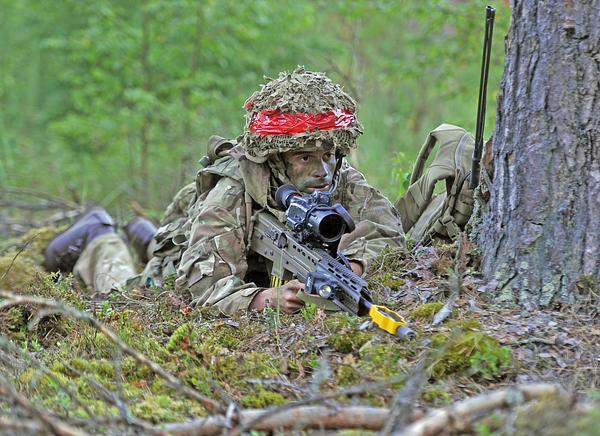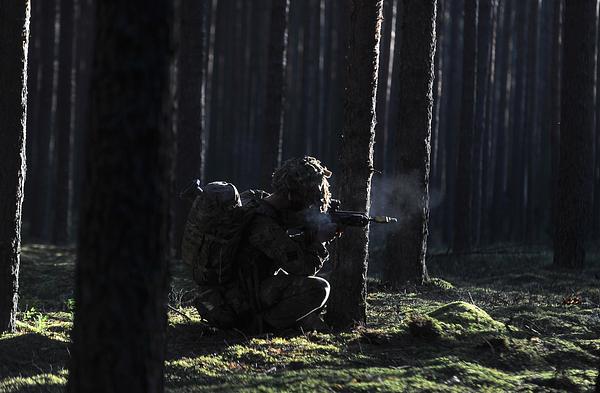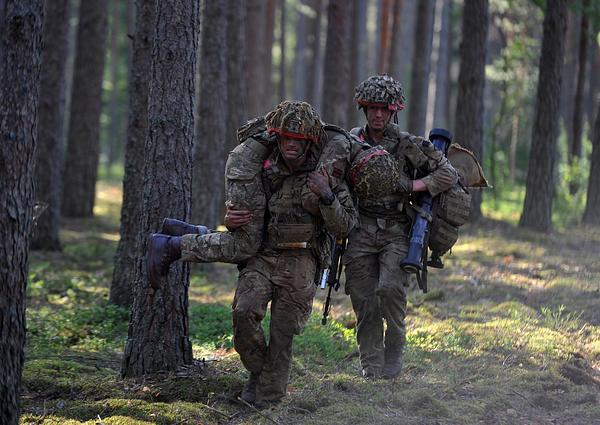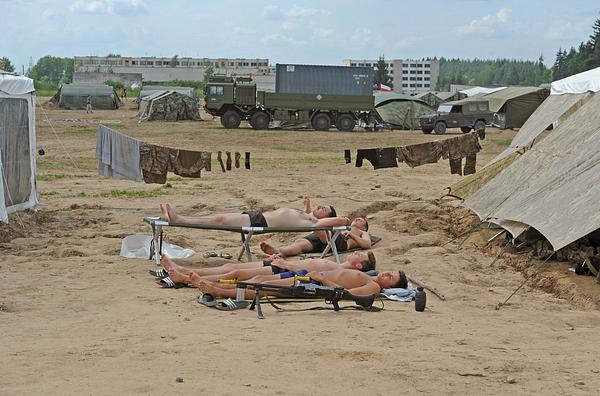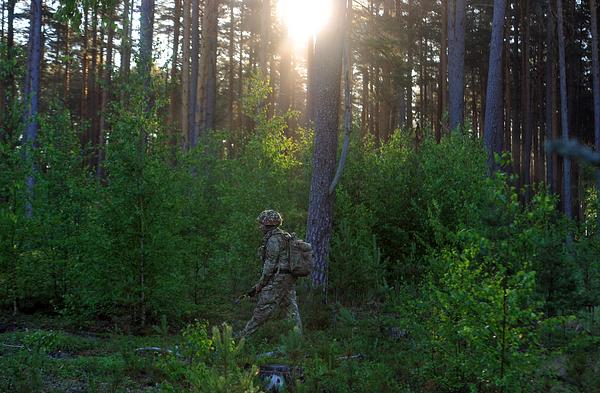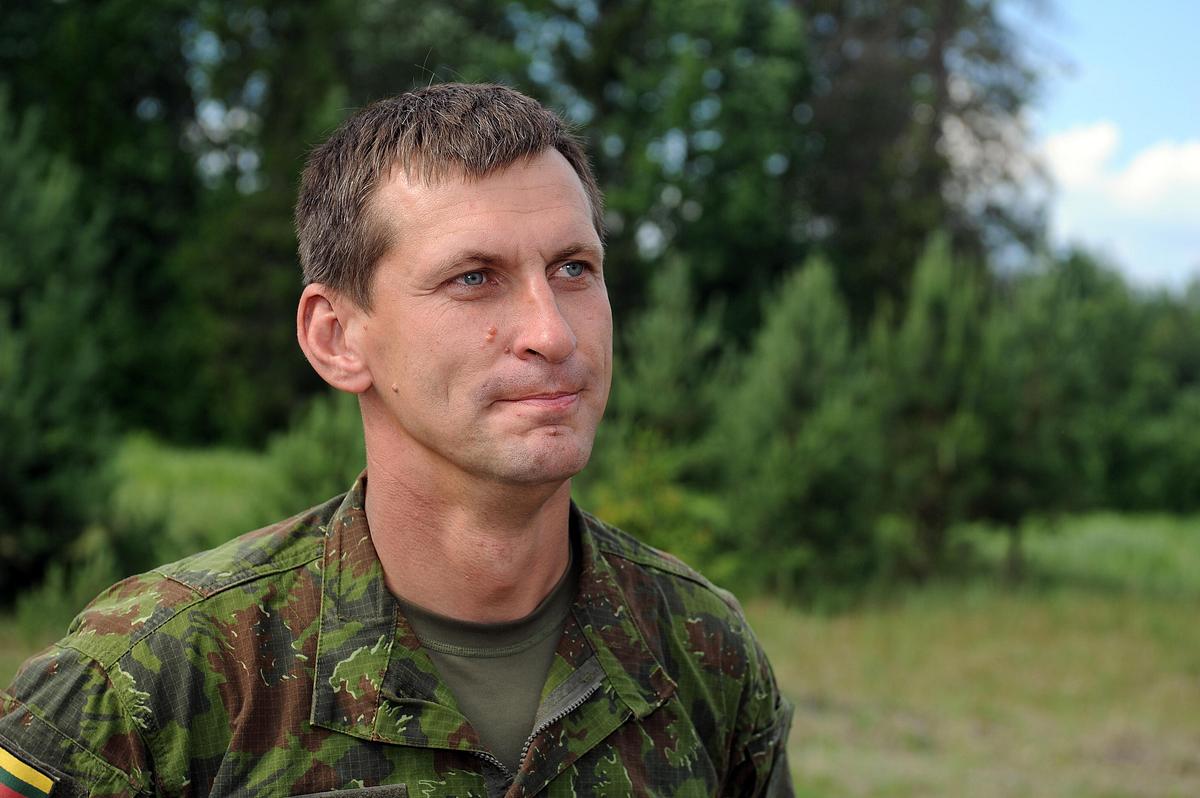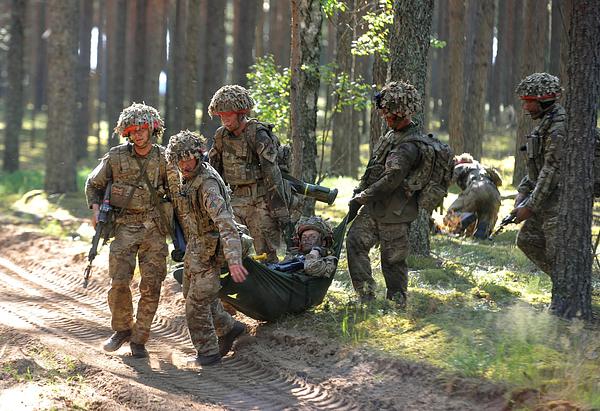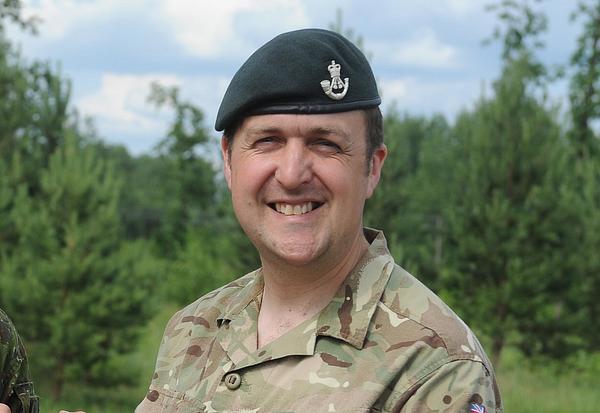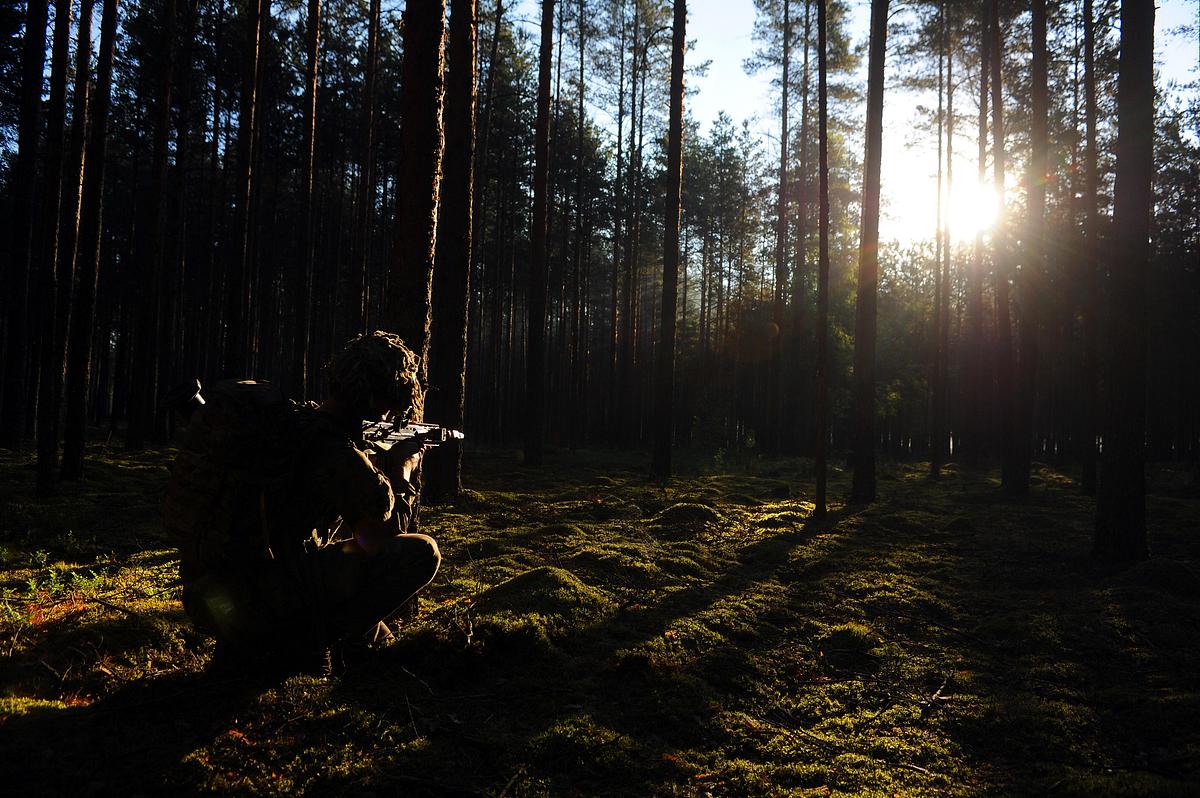Traversing through mosquito-infested swamps for six hours may not be anyone’s idea of fun but for the soldiers of 3 Rifles it is all part of the job description.
More than 100 men from the battalion, which is currently Edinburgh-based but recruits heavily from Yorkshire and the North-East and is due to move to Catterick in 2021, have been participating in a massive three-week NATO exercise in Lithuania - where the British soldiers’ successful attempt to cross a vast area of swampland considered by others to be impassable so they could launch a surprise attack on ‘enemy’ headquarters was the talk of their international allies for days after.
For those who took part - from time-served Afghanistan veterans to new recruits just months into their military careers - the shared sense of satisfaction from a job well done will outlast the unpleasant insect bites.
‘You train hard to fight easy’
Lieutenant Tom Nelson, a 25-year-old from York, says the challenge offers a good insight into Army life. “That is the military as a whole - you go through hardship and it pays off at the end,” he says. “The training I have had has been very, very difficult. But it is difficult for a reason - you train hard to fight easy.”
Nelson joined the military in 2017 after completing a Geography degree at Leeds University and went on to train as an officer at the famous Royal Military Academy Sandhurst. He was made a platoon commander in 3 Rifles at the age of just 24.
“My dad was in the RAF so I always knew I wanted to join the military. I loved sport when I was growing up and the military is a great place to pursue that. I like the idea of being in the outdoors, it is a bit more a physical job than just sitting in an office,” he explains. “That’s what attracted me to it, the camaraderie and the opportunity to travel really.
“Sandhurst is a very different place to university, your time is controlled, it is tough work but it is hard work. It is very rewarding.”
He says despite people in the Army coming from many different backgrounds, they all share a similar outlook on life. “The military is quite a unique place, you’re with like-minded people. Although on paper you are from all different walks of life, you are brought together by some common threads. You quite quickly build a really good relationship with the people you are with, everyone looks after each other.
“You go through a lot of hardship and it brings you closer together. Anything you ask them to do you can do yourself.”
Nelson’s brief military career has already involved exercises in Oman, Germany and Kenya, as well as a deployment in Ukraine last winter where military tensions are high following Russia’s annexation of Crimea in 2014 and martial law was temporarily declared in parts of the country following the Russian coast guard capturing three Ukrainian naval vessels while 3 Rifles were out there.
With their involvement in the NATO exercise in Lithuania with 4,000 other soldiers from countries such as Germany, Poland and Denmark designed as a show of strength to Russia to deter aggression towards the Baltic states, Nelson says he makes sure he understands the political implications of every exercise he goes on. “As a platoon commander the guys will ask you the questions of why are we here and what is going on and you are expected to have the answers.”
'You become a more loyal friend'
He says his job means he keeps a close eye on international developments to get an insight into where 3 Rifles could end up next. “I absolutely keep up with current affairs. The first thing you turn to in the paper is the world news.”
Nelson says being in the Army has changed his outlook on life.
“I don’t like wasting time now, I say yes to opportunities when they present themselves more. I would say you also become a more loyal friend - it is nothing to drive to the other side of the country to see someone.”
While the international exercises and war games taking place in Lithuania are helping to hone the skills of 3 Rifles, their hard-won reputation as being among the world’s best and bravest light infantry battalions was forged in recent years on the very real battlefields of Afghanistan. The wider Rifles regiment was formed in 2007 through the merger of four other regiments - The Devonshire & Dorset Light Infantry, The Light Infantry, The Royal Gloucestershire, Berkshire & Wiltshire Light Infantry and The Royal Green Jackets.
The 3 Rifles battalion suffered terrible losses in Afghanistan, with one six-month tour alone in late 2009 and early 2010 in Sangin in Helmand province alongside soldiers from other battalions in a 3 Rifles Battle Group resulting in 30 deaths and more than 100 injuries from a group of just 1,000 men. Many of the deaths at the hands of the Taliban were caused by improvised explosive devices.
Soldiers pay a ‘terrible price’
Commanding Officer Lieutenant Colonel Nick Kitson reflected at the time on the “terrible price” his soldiers had paid in trying to free Afghanistan of the Taliban and bring order and security to the local population.
“The name of 3 Rifles has been heavily associated with sacrifice,” he said. “Nothing can make up for the losses of friends, comrades and loved ones and we have paid a particularly heavy price. In addition many of our soldiers have suffered the severest injuries. Desperately painful as this is, we feel sure that these sacrifices have not been in vain.”
One 3 Rifles soldier who served in Afghanistan out in Lithuania explains how those who lost their lives from the battalion are still fondly remembered by their comrades and that many of the men serving out there would talk about how they could accept being shot but not being injured or killed by an IED.
Another of those in Lithuania with 3 Rifles who served in Afghanistan is Corporal Jake Hudson, a 30-year-old from Pontefract. He was 21 years old and in the first year of a business studies degree at Sheffield Hallam University in 2010 when he decided to leave higher education and join the military after feeling his qualification would not land him a job he wanted.
“My parents support me on anything I do. When I told them I wanted to join the Army, they weren’t surprised at all. As a kid, I was always playing with army men and all that.”
Hudson did two tours of Afghanistan - where more than 450 British servicemen have died since 2001 - as a member of 4 Rifles in 2011 and 2013. “You can be a bit naive thinking I can’t wait to get out there,” he explains. “But when you are on the plane and once you go over the border and the lights go off, the reality kind of hits you a bit.
“There were some good days and some bad days. We did have quite a lot of contacts with the enemy and your training kicks in. When you are in the situation you are focused but when you get back to camp it is a bit different.”
He says his second tour, where British soldiers were playing more of a supporting role to the Afghan National Army, was less intense as the situation had improved from the height of the fighting. But Hudson admits it is often a challenge for soldiers to adjust back to civilian life after tours of places like Afghanistan.
“I don’t know whether I should say this but the first few months back a lot of people get p****d off because they think what they have done isn’t appreciated. I have been to America and Canada and they are different over there in their treatment of the military.”
Hudson, who previously worked in a BT call centre before university, says despite the challenges of the job, he does not regret his decision to join the Army. “Don’t get me wrong, sometimes I think, ‘What I have done’? But it is a great job because you are doing different stuff all the time. It is the only job I have ever had where I haven’t got bored. The best bit is probably the lads, we have a laugh together.”
‘My parents are really proud of me’
At the other end of the experience scale is 21-year-old Rifleman Tom Pollard from Brighouse, who started his basic training in September and has only been attached to 3 Rifles for just over five weeks.
He says having previously done bar work and life-guarding, he is relishing his new life in the military.
“My parents are really proud of me,” he says. “It is full of top blokes, there is so much to learn, so much to do. It is the job of my dreams really. Being in Lithuania involved in such a big exercise has been amazing, it is what you sign up to do.”
One of those highly impressed with the conduct of 3 Rifles during the NATO exercise is Lithuanian Lieutenant Colonel Eugenijus Lastauskas, describing them as “outstanding”.
“Yorkshire should be very proud of them,” he says. “During the task to advance through the terrain, the speed and the way they did was very close to the mechanised formations which were on the move. But the biggest thing was the terrain they went through was almost impassable, with swamps filled with water and no trails. That is what they went through and achieved the task of destroying the enemy headquarters.
“They are very open, very friendly and very polite. The ladies serving the meals at the camp mentioned the Brits as an example of well-behaved polite behaviour. I even talked to my soldiers to say look at how the Third Rifles behave. I was really impressed with their professionalism. On the first day, I put a huge burden on them and said the Brits are known for being the best light infantry in the world so my expectations are huge. But I can tell you from the first day I said that about the best infantry in the world, I haven’t changed that opinion.”
Major Ben Moorhouse, company commander of 3 Rifles, says in addition to being impressed himself with the conduct of the Lithuanian soldiers, he was proud of his men. “For some of the guys it is their first exercise abroad, for some it is actually their first time abroad. The Lithuanian commander highlighted to us at the start about the level of expectation they had about the British troops and I think we have lived up to that. The lads have done a cracking job of representing the Army well.”
Mucking in against fierce storms
A sudden hailstorm which flooded and even overturned tents at the temporary camp 3 Rifles were sharing with Lithuanian, Polish and Danish soldiers brought the soldiers from different nations together, says Major Ben Moorhouse.
Hail the size of golf balls fell during an unexpected and fierce storm which left the British holding onto their tents, while one Lithuanian one flooded and a Danish one blew away.
Major Moorhouse said he was delighted to see his men take it upon themselves to help their international counterparts following the storm.
“They were mucking in and helping each other out, it was a big intermingling of different nations which was really nice. That was a nice moment of international cooperation.”
Lithuanian soldiers regularly headed over to the British tents to ask if they could swap their rations for the sought-after British ones.
Preventing World War Three
Yorkshire soldiers who have been participating in a massive NATO show of strength to Russia in Eastern Europe have contributed to “preventing a potential third World War” by acting as a deterrent, a senior Lithuanian Army commander has said.
Members of 3 Rifles Battalion, joined more than 4,000 other soldiers from across Europe in participating for almost three weeks in Exercise Iron Wold in Lithuania near the border of Belarus, a close ally of Russia.
Lieutenant Colonel Eugenijus Lastauskas, commander of the Vaidotas battalion, said the presence of the British soldiers and other NATO allies to deter the Russian threat to the former Soviet state would dissuade a possible invasion which would be likely to result in a global conflict.
"If things start to escalate, there is a big chance that escalation will go much wider than the Baltic region. By being here, the British troops are doing a great thing for the region and for Britain also - they are preventing a big war, a potential third World War," he said.
In Lithuania, which was part of the Soviet Union until 1990, fears of Russia have been stoked by the 2014 annexation of the Crimean peninsula in Ukraine. Since 2017, NATO allies have continually stationed forces in the former Soviet states of Lithuania, Estonia, Poland and Latvia - with Germany, the UK, the US and Canada taking responsibility in each respective country. At the time, then Defence Secretary Michael Fallon told the BBC that the deployment was necessary “because of the increased Russian aggression that we’ve seen and the need to reassure our allies on the eastern side of NATO”.
Escalating recent tensions in the Baltic region saw RAF jets in Estonia scrambled twice in two days to intercept Russian fighter aircraft flying to the north of the country.
According to NATO, its latest training exercise, carried out in the huge 85km2 Padrabe Training Area which is in the process of being more than doubled in size, was designed to show it is ready to defend its allies and their "solidarity, determination and ability to act by triggering an immediate Allied response to any aggression".
Major Ben Moorhouse, company commander of 3 Rifles, did not wish to be drawn on the extent of the Russian threat but said the exercise had been a productive one.
"The absolute focus is on NATO's capability. It is not all about the British Army's going out to the Baltic states, it is about bringing together NATO nations to demonstrate our capability and the resources we hold and the commitment to partner states and their protection."
A Military of Defence spokesperson said: “The UK is clear in its commitment to NATO, not only through meeting the NATO spending target but also through our contribution to NATO-led exercises, such as Iron Wolf.
“These exercises represent an excellent opportunity for our troops to develop their skills as well as demonstrating our commitment to allies at specific risk from Russia, including those in the Baltic Sea Region such as Lithuania.”
The Russian Embassy did not respond to request for comment.
Inside NATO’s Exercise Iron Wolf
The attack begins just after dawn. Initially the sound of gunfire through the forest is distant but it comes closer and closer as infantrymen from 3 Rifles battalion move swiftly through the trees away from the positions where they have spent the night to intercept and ambush the enemy tanks rolling through on their way to attack a nearby village.
Over the next three hours, the company of just over 100 soldiers sustain heavy casualties as they attempt to halt the progress of four heavily-armed enemy companies with the major advantage of being equipped with armoured vehicles. An Apache helicopter flies overhead as the battle rages on the ground.
The fallen injured are carried by some of their comrades to medical vehicles behind the front lines - as others who weren’t hit make a valiant attempt to attack the enemy from behind as the tanks continue their progress.
For centuries, British riflemen have prided themselves on being a fast-moving force and different to the other soldiers that make up the British Army. When they were introduced in the late 18th and early 19th centuries, instead of the classic ‘red coat’ worn by most infantrymen, Rifles wore green in the first attempt at camouflage by the British Army and marched at a quicker pace than other troops as they sought to cover large distances and difficult terrain in as unobtrusive a way as possible.
In 2019, this proud tradition is continued on this mission by the men of 3 Rifles, a Scottish-based regiment but who count large numbers of Yorkshiremen among their numbers as they recruit heavily from the region and the North-East of England.
Finally, those who have survived unscathed are able to take a break on the cloudless and already stiflingly-hot day as they await the trucks that will carry them back to relative serenity their temporary camp around an hour’s drive away. The exercise is over.
Exercise Iron Wolf in pictures
The ammunition may have been blanks, their ‘enemy’ being played by allies aiming to reach a purpose-built fake village designed for military training and casualties determined by military umpires rather than genuine injuries - but the war games that the British infantrymen engaged in deep inside a vast Lithuanian forest were designed to have a very real political effect.
Military chiefs in the Eastern European country believe their presence as part of NATO’s three-week long Exercise Iron Wolf alongside their 4,000 other soldiers from their multinational allies is, quite simply, helping to prevent the outbreak of World War 3.
A Russian military invasion of Lithuania or other Baltic states is not considered a high probability by the international community - but a large part of the reason for this is the presence of NATO means Moscow would be risking the start of a global conflict. As such, the exercise is designed to provide a fresh reminder of the multi-national military support the country of less than three million people enjoys.
Lithuanian battalion commander Lieutenant Colonel Eugenijus Lastauskas says: “For the Lithuanians, for the military, the threat that we have and the escalation that we have, particularly the Russian activities in Ukraine really sends a signal that our neighbour is not peaceful and he is willing to attack other countries.
“It is not only that he has the capability but he is willing to do this. Having UK forces in Lithuania is a clear signal Lithuania is not alone, the Baltics are not alone - don’t even try to do anything in this region.
“It is also very important not only for Lithuanians and the Baltics but also for Britain. Because if things start to escalate, there is a big chance that escalation will go much wider than the Baltic region.
“By being here, the British troops are doing a great thing for the region and a great thing for Britain also - they are preventing a big war, potentially the third World War happening.”
It is undoubtedly a huge claim but concerns about Russia are very real to the people of Lithuania, which was a Soviet-occupied state until 1990 and reintroduced compulsory military service in 2015 in response to Russia’s annexation of the Crimea peninsula in Ukraine - which is not a NATO member - the year before.
Since 2017, NATO allies have continually stationed forces in the former Soviet states of Lithuania, Estonia, Poland and Latvia - with Germany, the UK, the US and Canada taking responsibility in each respective country.
At the time, then Defence Secretary Michael Fallon told the BBC that the deployment was necessary “because of the increased Russian aggression that we’ve seen and the need to reassure our allies on the eastern side of NATO”.
The giant Padrabe training area where Exercise Iron Wolf has been taking place houses the German soldiers based in the country, with the 85km2 area largely made up of forest, in the process of being more than doubled in size.
NATO insists the measures it is taking are entirely defensive acts of reassurance to the Baltic states but in response, Russia has been adding new tank and missile defence units to its Baltic fleet. Russia also claims that the presence of NATO in the Baltics is unneeded and a threat to itself - something the organisation refutes.
Escalating recent tensions have seen RAF jets in Estonia scrambled twice in two days last month to intercept Russian fighter aircraft flying to the north of the country.
Lithuania says it has been frequently targeted by cyber attacks and on a recent visit to the ‘line of contact’ in Ukraine which separates Ukrainian troops from Russian-backed separatists, British Army chief of staff General Sir Mark Carleton-Smith told The Sun that Russia are turning to such “shadow war” tactics in the knowledge that NATO are “peerless” when it comes to conventional warfare.
‘Fear is not a word I would like to use’
NATO recently warned that a Cold War-era nuclear arms pact, called the Intermediate-Range Nuclear Forces treaty, is likely to collapse in August when the current agreement expires over Russia’s use of a disputed nuclear-ready cruise missile system.
Lt Colonel Lastauskas says there are no fears but genuine concerns from Lithuanians about the threat from Russia. “Fear is not a word I would like to use. There is concern, the feeling that we have is a neighbour who is not a friend right now. He chooses to escalate and he did it so many times with information operations and cyber attacks, including in our area so right now we understand that the threat is realistic and therefore we are taking measures.
“Fear is where a rabbit is afraid of a snake. We are taking measures, we are training actively. It sends a very strong message to our neighbour - don’t try to do any crazy things. There are plenty of capable troops and in the end, you will be defeated. Knowing our history, it is very important for our people to know we are not alone. Our message to Russia is very simple - don’t come here. We love our country, we know how to defend it and we are not alone.”
By contrast, the British - who have been sharing a temporary camp around an hour’s drive away from the main training area with Lithuanian, Polish and Danish soldiers - are understandably much more circumspect in publicly analysing the politics of both the region and the NATO mission.
While 3 Rifles are based in Edinburgh, they are due to move to Catterick in North Yorkshire from 2021 and recruit large numbers of soldiers from Yorkshire, with dozens of those on the exercise hailing from the region.
Major Ben Moorhouse, company commander of 3 Rifles, says it would not be appropriate for him to comment on Lithuanian concerns about Russia but added the exercise alongside multinational allies had been a fruitful one.
“The absolute focus is on NATO’s capability. It is not all about the British Army’s going out to the Baltic states, it is about bringing together NATO nations to demonstrate our capability and the resources we hold and the commitment to partner states and their protection.”
Captain Calum Ashurst says one of the highlights of the exercise for his troops was having the opportunity to work alongside international allies and getting a closer look at the Boxer armoured vehicles currently used by the German military which 3 Rifles are due to start using from 2023 as part of becoming a ‘strike’ force capable of deploying over distances covering thousands of miles with minimal logistical support.
“The key aspect for this whole exercise was inter-operability, it has been very interesting to see how our partners operate,” he says. “The guys have had a really interesting look at how a lot of these countries operate what they have got and how their soldiers work. One of the key reasons we wanted to come over is the Germans have the vehicles we want to have and we are just beginning to understand their capabilities.”
As part of the exercise, half of the company were flown out while the other half spent three days travelling from Edinburgh to Lithuania by road and ferry to bring their vehicles, supplies and weapons across Europe - making the same journey back at the end of operations earlier this week.
Captain Ashurst says: “We were the first here and will be leaving last, classic British.”
But for all the high politics surrounding the exercise, for many of the British soldiers taking part such matters are not their concern as they focus on their individual jobs. Lance Corporal Joe Flavell, a 23-year-old from Doncaster, joined the military in 2015 when he was 18 years old after leaving sixth form - inspired by both the opportunity to employ his passion for fitness and the BBC documentary series Our War which told the stories of the young soldiers who had served in Afghanistan.
“It was always in the back of my mind to join,” he says. “I worked in Sports Direct part-time on a zero hours contract and hated it, I couldn’t do it. When I was doing my Army training, it was just regular lads like me.”
His time in 3 Rifles has already involved trips to Georgia and Kuwait and he says that with this exercise, he is not paying much attention to the politics that surrounds it. “To me, it is just another exercise.”
